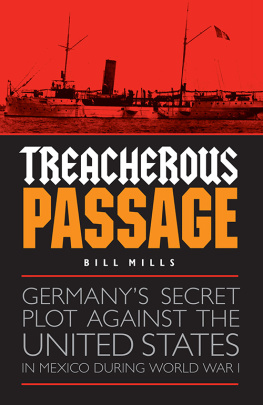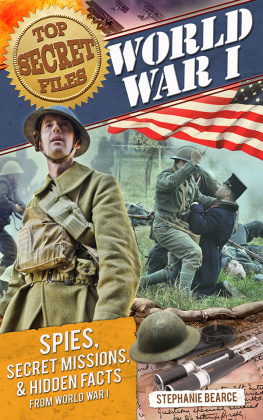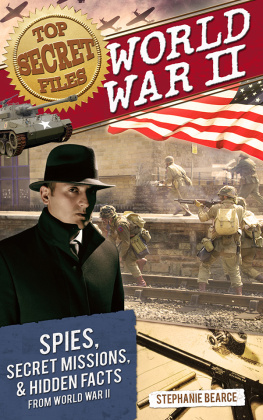Alexander Rose - The Lion and the Fox: Two Rival Spies and the Secret Plot to Build a Confederate Navy
Here you can read online Alexander Rose - The Lion and the Fox: Two Rival Spies and the Secret Plot to Build a Confederate Navy full text of the book (entire story) in english for free. Download pdf and epub, get meaning, cover and reviews about this ebook. year: 2022, publisher: HarperCollins, genre: Non-fiction. Description of the work, (preface) as well as reviews are available. Best literature library LitArk.com created for fans of good reading and offers a wide selection of genres:
Romance novel
Science fiction
Adventure
Detective
Science
History
Home and family
Prose
Art
Politics
Computer
Non-fiction
Religion
Business
Children
Humor
Choose a favorite category and find really read worthwhile books. Enjoy immersion in the world of imagination, feel the emotions of the characters or learn something new for yourself, make an fascinating discovery.
- Book:The Lion and the Fox: Two Rival Spies and the Secret Plot to Build a Confederate Navy
- Author:
- Publisher:HarperCollins
- Genre:
- Year:2022
- Rating:3 / 5
- Favourites:Add to favourites
- Your mark:
- 60
- 1
- 2
- 3
- 4
- 5
The Lion and the Fox: Two Rival Spies and the Secret Plot to Build a Confederate Navy: summary, description and annotation
We offer to read an annotation, description, summary or preface (depends on what the author of the book "The Lion and the Fox: Two Rival Spies and the Secret Plot to Build a Confederate Navy" wrote himself). If you haven't found the necessary information about the book — write in the comments, we will try to find it.
The Lion and the Fox: Two Rival Spies and the Secret Plot to Build a Confederate Navy — read online for free the complete book (whole text) full work
Below is the text of the book, divided by pages. System saving the place of the last page read, allows you to conveniently read the book "The Lion and the Fox: Two Rival Spies and the Secret Plot to Build a Confederate Navy" online for free, without having to search again every time where you left off. Put a bookmark, and you can go to the page where you finished reading at any time.
Font size:
Interval:
Bookmark:

Liverpool around the time of the Civil War
Illustrated London News Ltd./Mary Evans Picture Library
To Rebecca and Edmund, again and as always
Who hath taken this counsel against Tyre, the crowning city, whose merchants are princes, whose traffickers are the honorable of the earth?
ISAIAH 23:8
Where the lions skin will not reach, it must be patched out with the foxs.
PLUTARCH
I
A s his ship plowed toward the Mersey, the Mississippi River of England, Thomas Dudley finally glimpsed his destination. Liverpool, coal dark and forbidding amid the murky fog, was rising ominously before him. It had been a long voyage to the Bloody Spot, as the mighty port was known, and Dudley would soon find out why.
A doleful, dismal sounda great bell repeatedly tolling, as if welcoming him to Hadesechoed across the cold, roiling water. It seemed to resonate from the very vault of the deep. But it was not in fact a call for the dead; no, it was merely the famous Bell-Buoy, a marker that pealed fast or slow depending on the agitation of the waves. In a calm, it was dumb. In a breeze, it rang gently. And amid turbulence, it served as an urgent tocsin alerting mariners to flee.
When Dudley and his family disembarked the passenger ship Africa at Princes Dock that November 19, 1861, he might have wondered whether he ought to have heeded the Bell-Buoys warning. As they gingerly made their way along the quay, the Dudleys were pestered by quacks selling liquor-laced snake oil, shiv-armed con men flogging painted gold rings, and pubescent thieves who stalked the innocent like Sicilian assassins until, quick as a flash, a pocket was picked. Perhaps, instead of becoming the new American consul here, he should have taken that ambassadorship to Japan that President Lincoln had offered him.
Now heading toward the street, he could see the so-called body seekers roaming the docks for the corpses of those who had fallen overboard or been washed in from the river, the latter usually murder victims. The rubbish rakers, too, were at work: Tattered paupers picked through heaps of dunnagebroken cargo crates and other wastehoping to find some overlooked treasure, like a length of rope or a few copper nails.
For newcomers like Dudley, setting foot in Liverpool was a harrowing experience. America could be rough but not like this. The first shock were the beggars, ragged and wretched. Here it was not the existence of the penniless that staggered, it was the scale of poverty, so much so that there were four official gradations: the almost poor, the poor, the very poor, and the permanently destitute.
They lined the external wall of the dock. Some were crippled sailors fallen on hard times and others former factory workers whose limbs had become entangled in a machines spindles and cogs. But the majority were women, so parched and starved they resembled mummies; cadaverous teens with the gallows in their eyes; and shoeless children with pinched faces and scrawny bodies, whose mothers strove to scratch a living darning socks or selling pigs feet while their fathers, if they knew them, were at sea. The sailors life was a precarious one: A man would be away for months at a time and he was rarely advanced cash. For those left behind, the rent was always overdue and everything was in pawn.
All along the waterfront, businesses catered to the marine trade. Many were respectable. Some sewed flags; chandlers sold holystones for swabbing wooden decks and cotton rags for cleaning steam valves; other firms made paint. Tarpaulins, ropes, and sails were their own specialties. For a quick bite, one could pick up from numerous stalls chunks of sweaty cheese and cuts of greasy bacon, dubious-looking potted herrings, and only slightly rotten apples scrumped from some landowners orchard. For life at sea, sailors bought Epsom salts and hair oil from the apothecary or stopped by secondhand shops for cracked crocks and discarded forks. For the wife and kids, there were tinsel ornaments, ancient furniture perhaps better employed as firewood, vermin-infested mattresses, and cheap toys.
Cheek by jowl with the better merchants were the hundreds of black market marine store dealers, who dealt in goods stolen from the docks. A cartel of them called the Forty Thieves was run by one Bernard Connelly, known in the underworld as Long Barney. The most notorious dealer in Liverpool when Dudley arrived, he stood at six foot five, terrified police constables, and boasted a lengthy criminal record of assaults, swindles, counterfeiting, and general mayhem. Thanks to the activities of Connelly and his like, the number of convictions for theft in Liverpool was seventeen times higher than that of the cities of Manchester, Salford, Bolton, and Preston combined.
Then there were the lodging houses where crimps like Paddy Dreadnought and Shanghai Davies bribed owners to allow them to kidnap drunk-into-a-stupor boarders and sell them off to a captain needing crew for runs to China or America. Occasionally, the tables were turned: The redoubtable Ma Smyrden, a landlady of Pitt Street, had recently become a legend for foisting a corpse onto the local crimp.
Even in the better lodging houses, proprietors packed in as many customers as they could. In one memorable instance, ninety-two people were squeezed into a house meant for nineteen. That may have been an outlier, but not by so much: Liverpool was by far the most densely populated city in the country. In 1844, a Dr. Duncan discovered that in one area 7,938 people were crammed into 811 houses, a figure he equated to a density of nearly 660,000 people per square mile. In comparison, the worlds densest city today is Manila, at somewhat more than 100,000 people per square mile, with New York Cityby far the highest in the United Statesstanding at a paltry 27,000.
Liverpool had until recently been a small seaside town, but immigration and industrialization had caused its population to explode from 138,000 in 1821 to 444,000 in the year Dudley stepped ashore. There was nowhere to put the new arrivals, many from rural Ireland and England. And so some 39,000 residents, described as pale, yellow, ghastly, parchment-faced looking creatures, lived troglodytically in 7,800 smoke-fugged cellars, with tens of thousands more wedged into the nooks and crannies of every typhus-ridden tenement. Another 25,000 children lived on the streets and on their wits.
The housing shortage naturally pushed people onto the streets and into pubs in search of personal space. Gibraltar Row, which Dudley would have seen to his left as he left Princes Dock, was one of the worst streets in Liverpool. It was crammed with grog shops, spirit vaults, penny-ale cellars, and gin palaces, where it was not unusual to see a three-year-old knocking back booze with his older siblings for company. Inevitably, there was a criminal element: illegal gambling, fencing of stolen goods, bare-knuckle boxing, and dogfighting, usually. And scams, it goes without saying. Victims (flats) were mercilessly bamboozled, fleeced, plundered, and swindled by numberless sharpers, magsmans, duffers, smashers, and cross-my-palm-with-silver clairvoyants.
In Liverpool, for many there wasnt much else to do but drink. As there were no licensing lawsanyone could essentially open a tavern in his or her own housethe number of drinking establishments in Liverpool would, if all lined up, have extended some eleven and a half miles. Within a radius of 150 yards of the Sailors Home in Canning Place, for instance, there were no fewer than forty-six pubs for the recuperating and the impoverished to frequent.
Font size:
Interval:
Bookmark:
Similar books «The Lion and the Fox: Two Rival Spies and the Secret Plot to Build a Confederate Navy»
Look at similar books to The Lion and the Fox: Two Rival Spies and the Secret Plot to Build a Confederate Navy. We have selected literature similar in name and meaning in the hope of providing readers with more options to find new, interesting, not yet read works.
Discussion, reviews of the book The Lion and the Fox: Two Rival Spies and the Secret Plot to Build a Confederate Navy and just readers' own opinions. Leave your comments, write what you think about the work, its meaning or the main characters. Specify what exactly you liked and what you didn't like, and why you think so.










